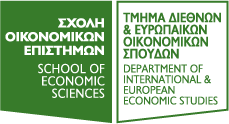Labor Economics
Type of course: Compulsory for the specialization “International and European Political Economy”
NUMBER OF ECTS CREDITS ALLOCATED: 6 ECTS credits
Learning outcomes of the course unit
The course aims to present an overview of the literature of modern labour economics in both theoretical and empirical level and apply models and techniques learned in the basic courses of micro and macro analysis on issues relating to the labour market.
After completion of the course students should be able to:
- understand the basic features and the latest developments of the labour markets in developed countries.
- use the basic optimization techniques in order to solve problems concerning employment and wages.
- evaluate the empirical studies of the labour market such as issues in labour demand and supply, the impact of labour unions, the search models, the effect of minimum wages and unemployment benefits on unemployment and wages, rigidities in the labour markets.
Prerequisites and co-requisites: “Not applicable”
COURSE CONTENTS
- Introduction
- The demand for labour.
- The supply of labour
- Household production
- Equilibrium in the labour market
- Compensating wage differentials
- Investment in human capital
- Worker mobility
- Unions and the labour market
- Rigidities in the labour market - minimum wages
- Search models
- Unemployment
Recommended or required reading
- Labor Economics, G. Borjas, Publications Kritiki, 2016 (alternative textbook)
- Modern Labor Economics Theory and Public Policy, 2017, Ehrenberg R.G. and Smith R.S., Broken Hill (recommended textbook)
PLANNED LEARNING ACTIVITIES AND TEACHING METHODS
2 regular two-hour lectures per week. The internet-based communication platform with students (e-class) contains lecture handouts, multiple choice questions, exercices and case studies, bibliography for assignments.
ASSESSMENT METHODS AND CRITERIA: Final written exam and assignments.
LANGUAGE OF INSTRUCTION: Greek





 Patision 76
Patision 76 2108203 106 / 2108203 107
2108203 106 / 2108203 107 
